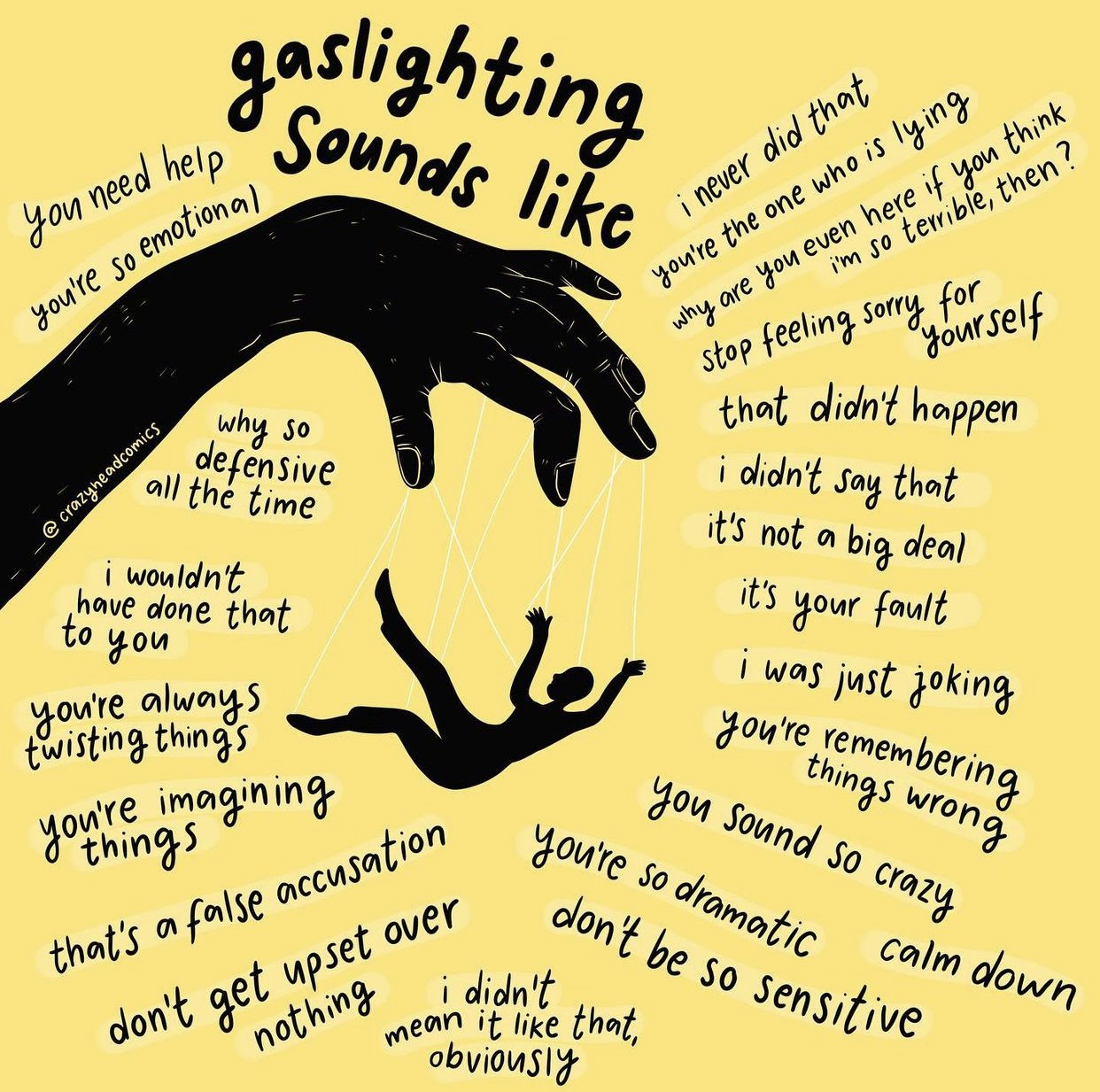7 Key Steps to Respond to Gaslighting
Art by @crazyheadcomics
Do any of the phrases in the image sound familiar? Do you feel like your thoughts, emotions, perceptions, and sanity are challenged in your relationship? Do you feel like you are living in a giant contradiction machine? If you answered yes to the above, your partner could be a narcissist and is actively gaslighting you in your relationship.
Narcissistic Personality Disorder
The Diagnostic and Statistical Manual of Mental Disorders (DSM-5) places narcissism under the category of narcissistic personality disorder. Narcissistic personality disorder is a mental condition in which people have an inflated sense of their own importance, a deep need for excessive attention and admiration and a lack of empathy for others. Narcissists also have very low self-esteem and very fragile egos. Although they may seem confident, they struggle greatly in this regard, and their relationships tend to be affected immensely. Signs and symptoms of narcissistic personality disorder and the severity of symptoms vary. Your importance is valued by how well you are meeting the needs of the narcissist. Once you no longer meet the narcissist’s excessive needs, you lose all value and prominence in the relationship.
Signs of Gaslighting in Relationships
A narcissist has certain behavioral patterns that highlight their gaslighting tactics. These behaviors include:
Blame - This tactic is employed to allow a narcissist to maintain control of a situation by not taking accountability for their actions and twisting things around to where you are at fault for their behavior.
Self Doubt - Narcissists instill self doubt in you and your mental faculties when discussing your feelings, mental state, physical appearance, and competency.
Manipulation of events - Narcissists dismiss, divert, disagree, or ridicule your memory of events. This often includes a complete rewrite of actual events.
Targeted crazymaking phrases - Narcissists will use phrases such as too sensitive, overreacting, I never said that or crazy when you try to speak about how low they make you feel or how your needs are not being met in the relationship.
Consistent Lying – Narcissists tend to blatantly lie but will never admit to lying. They create a rationale for the lie making it true in their own twisted minds. Lies are used as part of the narcissist’s toolkit to maintain control and create a false narrative about your character.
State of Confusion – Narcissists remove clarity from conversations, speaking in “word salad” and/or ambiguities increasing their ability to twist future situations.
Projection - Narcissists tend to transfer their actions to their partners by accusing their partners of their wrongdoings ( e.g., cheating, lying). The partner, in turn, finds themselves defending themselves for things they did not do.
Buildup and Tear Down – A narcissist will actively flatter you and criticize you at the same time. This causes you to stay in a constant state of cognitive dissonance questioning if the narcissist is a loving, caring person deep down or truly a mean spirited and deceitful human being.
Gaslighting is psychological warfare. It undermines everything you believe about who you are and what you are capable of to the point that you begin to believe what the narcissist says to you as truth.
How To Successfully Respond to Gaslighting In Your Relationship
When dealing with a narcissist, you have to build your mental strength and have a support system in place to protect your mental health.
7 Key Steps to Respond to Gaslighting
1. Learn the traits of gaslighting.
2. Spend time alone to recollect and deal with your emotions when your memories have been questioned.
3. Hold onto your recollection of events. Don’t let the narcissist reprogram your memory.
4. Gather evidence. Take pictures, record audio or take notes following conversations.
5. Speak with family and friends. Get their perspectives on your recollection of events.
6. Speak to a licensed therapist to help build your mental strength.
7. Focus on self-care and taking care of your mental health.
Final Thoughts
Remember, the goal of a narcissist is to make you question your own thoughts and memories through gaslighting. They want to distort your reality. Gaslighting causes one to doubt their gut feelings and recollection of events.
If you have feelings of doubt, apologize for everything that goes wrong in your relationship, are often confused, unhappy, and not your typical logical self, then seeking professional help is essential to safeguard your mental health. Having that outside professional perspective can highlight things you are unable to see due to your connection to the narcissist. Once you learn to look at the narcissist in a more detached way, their gaslighting tactics will become less impactful allowing you the opportunity to take more deliberate action on how to respond and what to do about your relationship.


